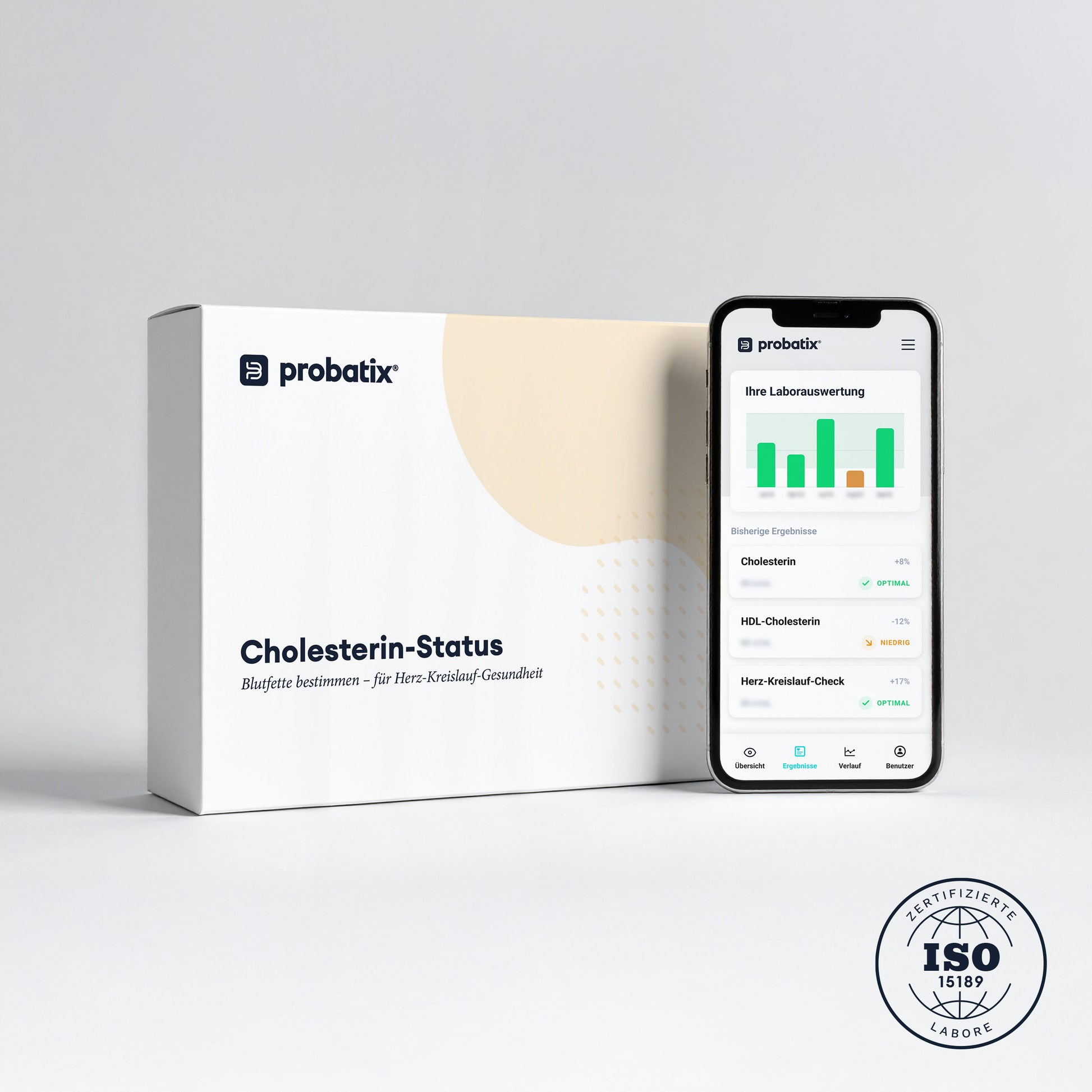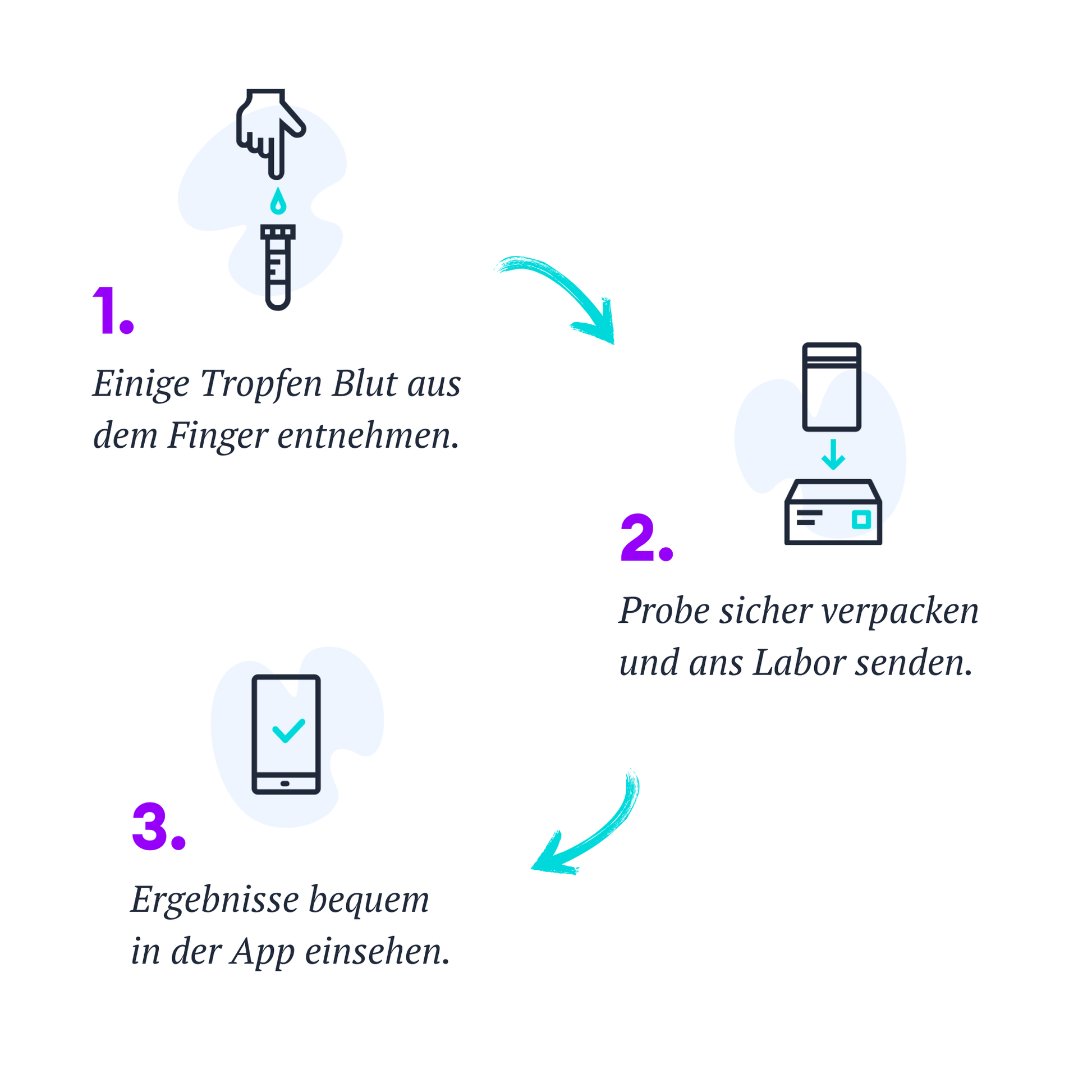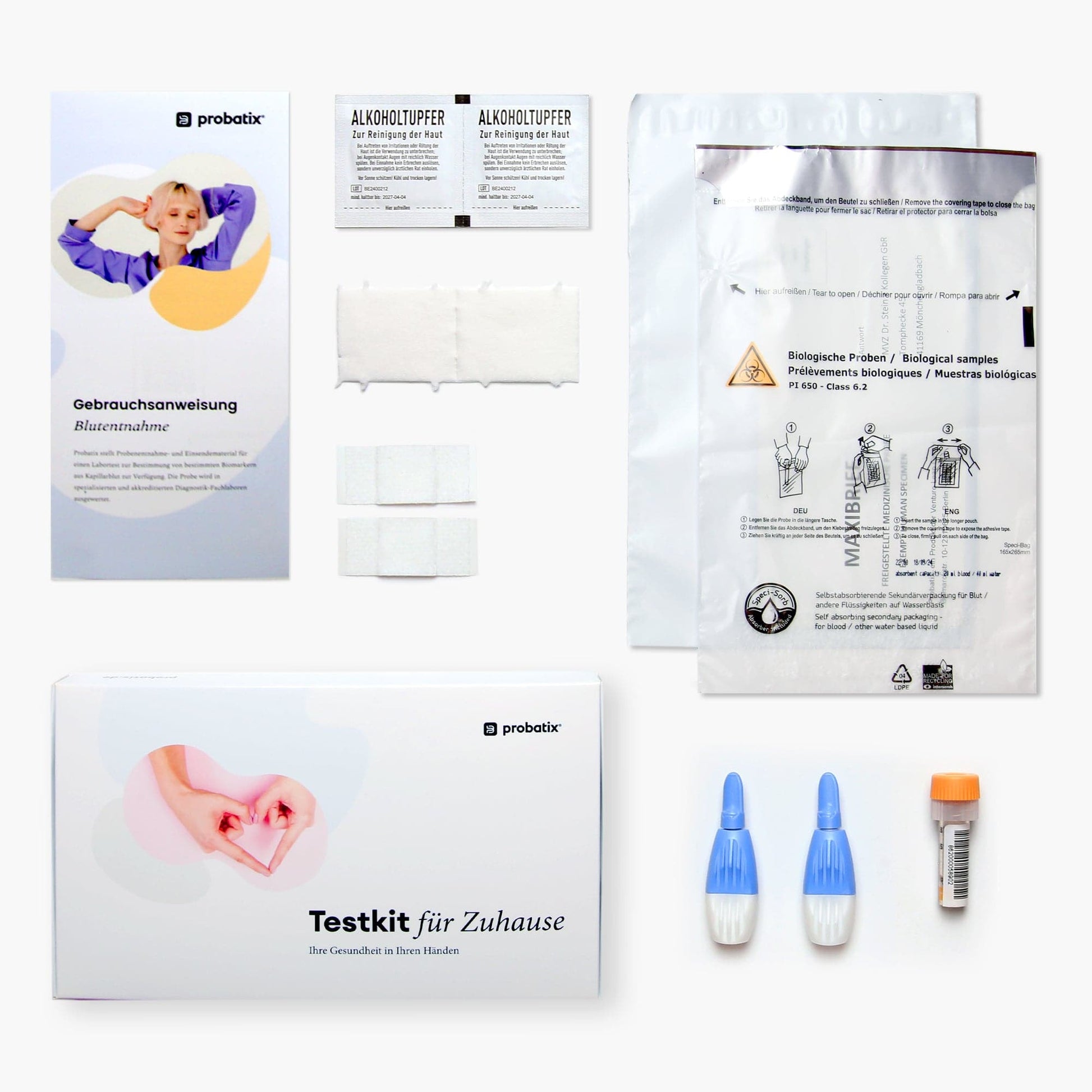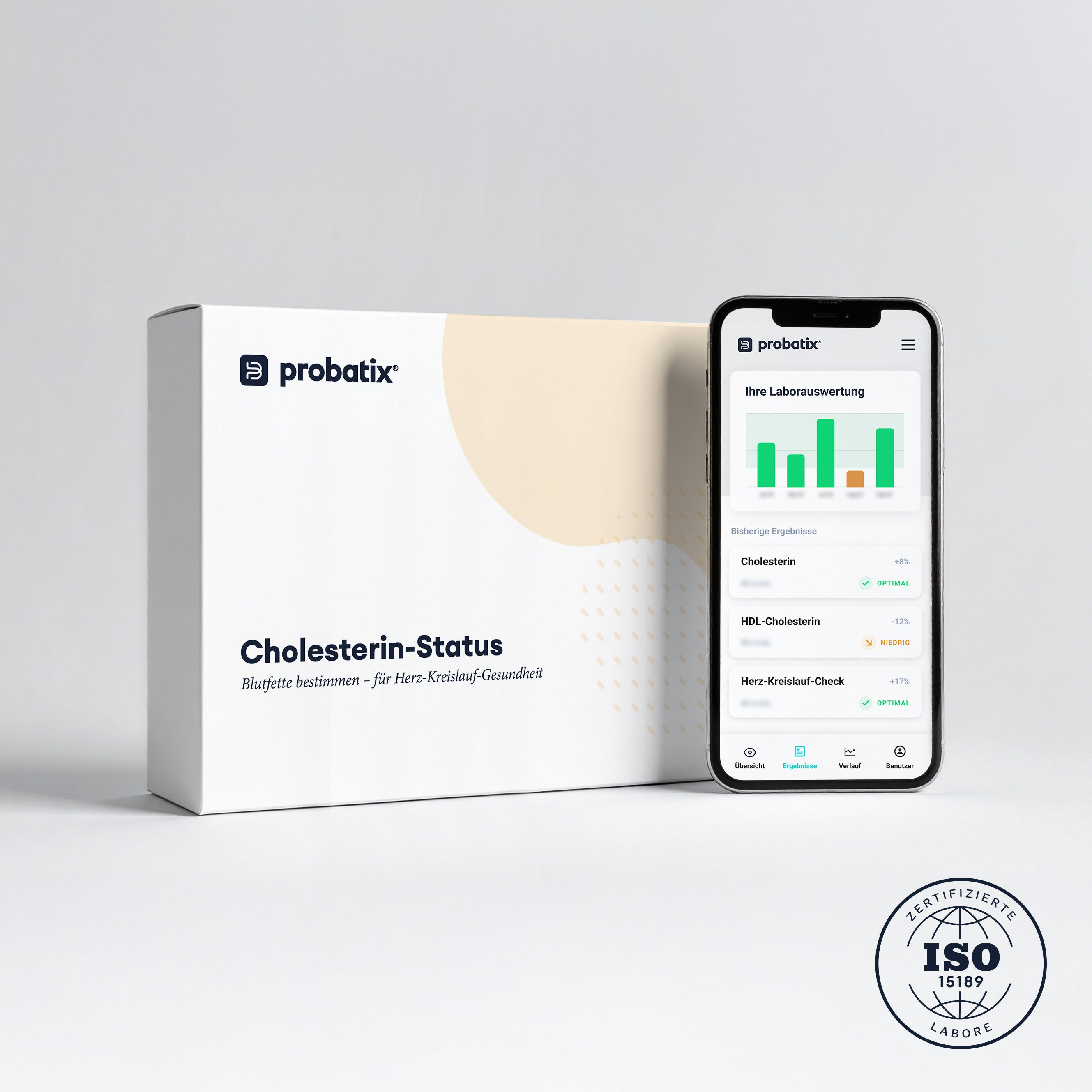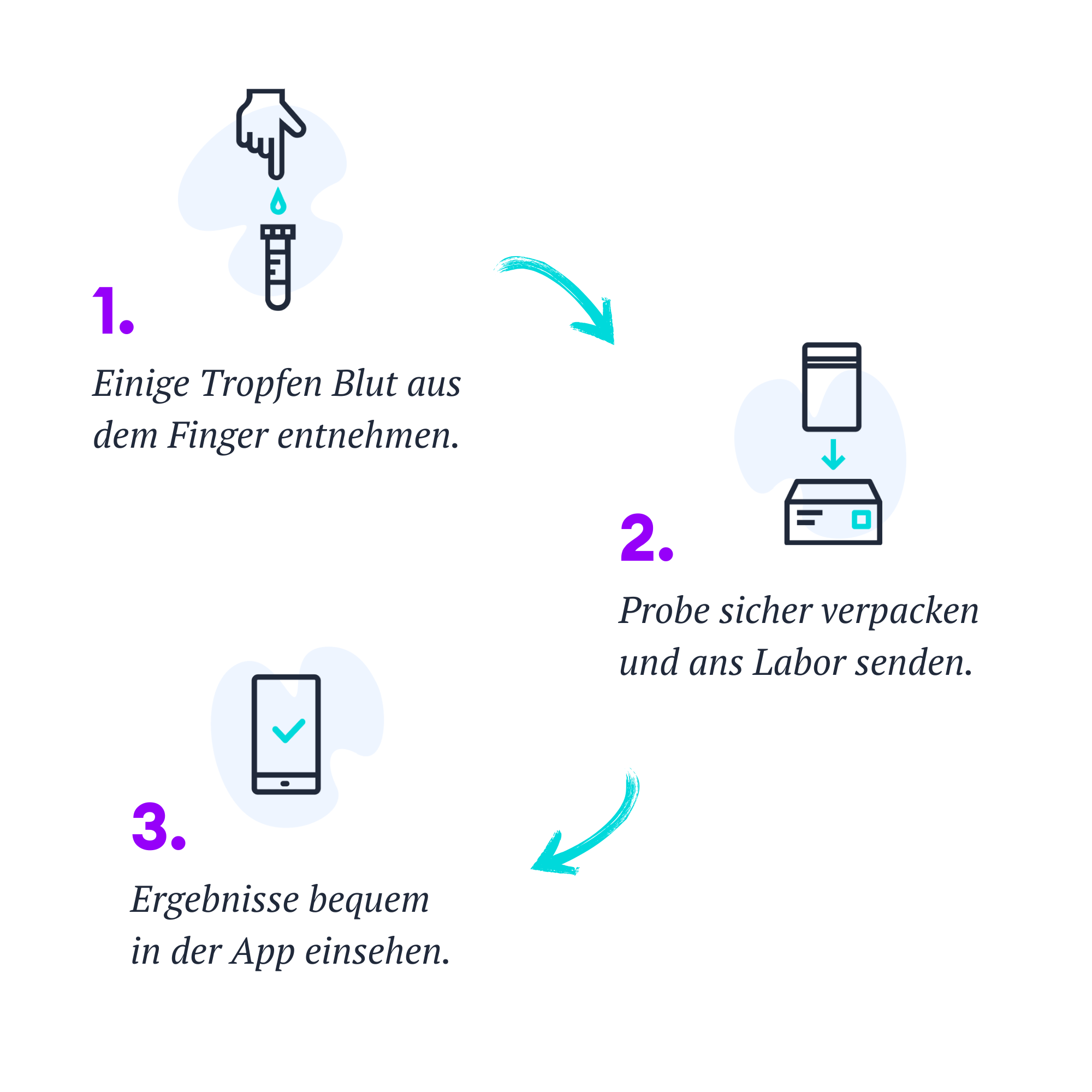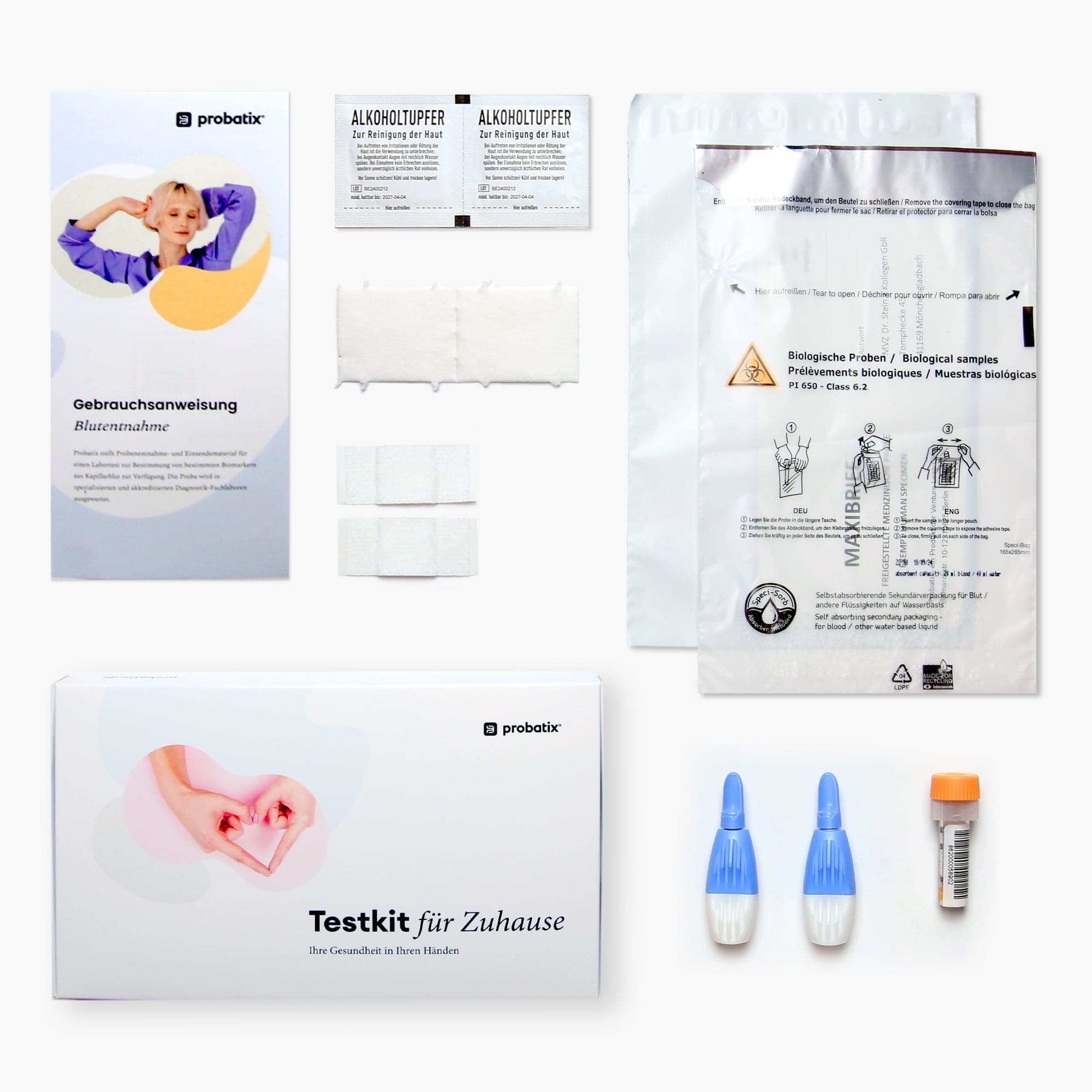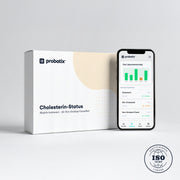Cholesterol Status
Cholesterol Status
Keep an Eye on Cholesterol – for a Healthy Cardiovascular System.
- Precise Analysis: Measurement of total cholesterol, LDL, HDL, and triglycerides.
- Early Detection: Provides insights into risks for cardiovascular diseases.
- Simple & Convenient: Sample collection from home with professional lab evaluation.
A Clear View of Your Cholesterol Levels – for More Security in Prevention.
Tip: Get an even better picture of your heart health with our Cardiovascular Risk Profile.
In stock
What values does this test measure?
What values does this test measure?
Further information on the values can be found here.
How does it work?
How does it work?
1. Take a sample with our test kit
2. Send the sample to the lab with the prepaid envelope
3. View results digitally after a few days
Why are the values reliable?
Why are the values reliable?
All tests offered by us are evaluated and validated in certified medical laboratories in Germany.
This is what the press says about our tests
Cholesterol Status: All details about the test
What benefits does this test offer me?
What benefits does this test offer me?
Fill in the text content of the collapsible item here. You can provide details and explanation for the question here.
Bring your cholesterol levels into balance – for a healthy cardiovascular system.
The Lipid Check analyzes your blood lipid levels such as total cholesterol, LDL, HDL, and triglycerides. These values are crucial for assessing your risk of cardiovascular diseases and taking early countermeasures.
Why test now? Elevated blood lipid levels often go unnoticed and can impair your vascular health in the long term. With the Lipid Check, you gain clarity about your status and can take targeted action.
Your benefits:
- Targeted analysis: Measurement of the key blood lipid levels for your heart health.
- Simple and convenient: Sample collection flexibly from home.
- Clear feedback: Your individual report shows your values compared to the normal ranges.
Prevent cardiovascular diseases – with the lipid check from
What do the measured values mean?
What do the measured values mean?
Fill in the text content of the collapsible item here. You can provide details and explanation for the question here.
LDL cholesterol is referred to as "bad cholesterol" because it transports cholesterol from the liver to the body's cells. Excess LDL can deposit in the vessel walls and form so-called plaques. These deposits narrow the vessels and increase the risk of cardiovascular diseases.
High LDL levels are an important risk factor for arteriosclerosis, heart attack, and stroke. Low levels, on the other hand, are considered beneficial for vascular health.
HDL cholesterol
HDL cholesterol is often referred to as "good cholesterol" because it transports excess cholesterol from the vessels to the liver. There, it is broken down or recycled, reducing deposits in the arteries. Thus, HDL helps to keep the vessels healthy and free from calcifications.
High HDL levels are considered beneficial as they are associated with a lower risk of cardiovascular diseases. On the other hand, low levels increase the risk of arteriosclerosis and heart attack.
Cholesterol
Cholesterol is a fat-like substance that the body needs for many important functions. It is a building block of cell membranes, a precursor for hormones such as estrogen and testosterone, and for the production of bile acids. A portion is absorbed through food, but the majority is produced in the liver.
Excessive cholesterol levels can lead to deposits in the vessel walls and increase the risk of cardiovascular diseases. However, a balanced level is important, as cholesterol is also essential for health.
Triglycerides
Triglycerides are the main form of fats in the body and are primarily stored in fat cells. They are formed when excess energy from food is converted into fat. Some triglycerides circulate in the blood and serve as an energy source.
Elevated triglyceride levels can increase the risk of cardiovascular diseases, especially when LDL is high and HDL is low at the same time. Very high levels can also trigger inflammation of the pancreas.
Why is this test important?
Why is this test important?
Fill in the text content of the collapsible item here. You can provide details and explanation for the question here.
The lipid check is crucial for monitoring your blood lipid levels and keeping your cardiovascular system healthy.
- Blood lipid levels and energy balance: Monitoring blood lipid levels and energy balance
- Cholesterol levels: Ensuring healthy cholesterol levels
- Cardiovascular protection: Promoting cardiovascular protection through "good" HDL cholesterol
- Cardiovascular risk: Monitoring cardiovascular risk through "bad" LDL cholesterol
When should I take this test?
When should I take this test?
Fill in the text content of the collapsible item here. You can provide details and explanation for the question here.
A lipid check can be useful for the following symptoms or risk factors:
- Overweight or obesity
- High blood pressure
- Diabetes or insulin resistance
- Family history of heart disease or strokes
- Poor dietary habits (high fat and sugar content)
- Lack of physical activity
- Smoking
- Constant fatigue or shortness of breath during physical activity
Consult a doctor to discuss your results and take appropriate measures.
What is included in the test kit?
What is included in the test kit?
Where can I find the instructions?
Where can I find the instructions?
Fill in the text content of the collapsible item here. You can provide details and explanation for the question here.
Die Anleitung für diesen Labortest finden Sie auf Instructions: Capillary Blood Tests.Bei Fragen hilft Ihnen auch immer gerne unser wunderbarer Support weiter: support@probatix.de
FAQ - More Frequently Asked Questions about the Test
FAQ - More Frequently Asked Questions about the Test
Fill in the text content of the collapsible item here. You can provide details and explanation for the question here.
1. What does the Lipid Check measure?
The Lipid Check measures various blood lipid levels such as total cholesterol, LDL, HDL, and triglycerides. These values provide information about the risk of cardiovascular diseases.
2. Who is the Lipid Check suitable for?
The test is suitable for anyone who wants to monitor their blood lipid levels, especially those with a family history, overweight, or an increased risk of cardiovascular diseases.
3. Why are blood lipid levels important?
Elevated blood lipid levels, such as high LDL cholesterol or triglycerides, can increase the risk of heart attack, stroke, and other cardiovascular diseases. The test helps to identify these risks early.
4. How is the Lipid Check conducted?
The test is performed through a simple blood sample, which you can conveniently take at home. The sample is then sent to our laboratory for analysis.
5. How long does it take for the results to be available?
The results are usually available within a few days on your personal
6. What do the test results indicate?
The results show whether your blood lipid levels are within the normal range or if action is needed to reduce your cardiovascular risk.
7. What can I do if my blood lipid levels are elevated?
Elevated blood lipid levels can be reduced through lifestyle changes, such as a healthy diet, regular exercise, and in some cases, medication.
8. How often should I have my blood lipid levels checked?
It is recommended to perform the lipid check regularly, especially if you have risk factors for cardiovascular diseases. Your doctor can help you determine the optimal frequency.
Das sagen unsere Kunden
